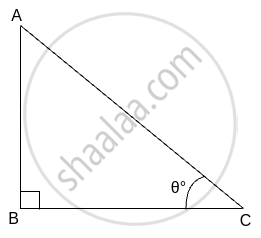Advertisements
Advertisements
Question
Prove the following trigonometric identities.
sec A (1 − sin A) (sec A + tan A) = 1
Solution
We have to prove sec A(1 − sin A)(sec A + tan A) = 1
We know that sec2 A − tan2 A − 1
So,
sec A(1 − sin A)(sec A + tan A) = {sec A(1 − sin A)}(sec A + tan A)
= (sec A − sec A sin A)(sec A + tan A)
= `(sec A - 1/cos A sin A) (sec A + tan A)` ...`(∵ sec theta = 1/costheta)`
= `(sec A - sin A/cos A) (sec A + tan A)` ...`(∵ tan theta = sin theta/costheta)`
= (sec A − tan A)(sec A + tan A)
= sec2 A − tan2 A
= 1 = R.H.S. ... (∵ sec2 θ = 1 tan2 θ)
APPEARS IN
RELATED QUESTIONS
Prove the following identities:
`(i) cos4^4 A – cos^2 A = sin^4 A – sin^2 A`
`(ii) cot^4 A – 1 = cosec^4 A – 2cosec^2 A`
`(iii) sin^6 A + cos^6 A = 1 – 3sin^2 A cos^2 A.`
Prove the following identities, where the angles involved are acute angles for which the expressions are defined:
`(cosec θ – cot θ)^2 = (1-cos theta)/(1 + cos theta)`
Prove the identity (sin θ + cos θ)(tan θ + cot θ) = sec θ + cosec θ.
Evaluate without using trigonometric tables:
`cos^2 26^@ + cos 64^@ sin 26^@ + (tan 36^@)/(cot 54^@)`
Prove the following trigonometric identities.
`(sec A - tan A)/(sec A + tan A) = (cos^2 A)/(1 + sin A)^2`
Prove the following trigonometric identity.
`(sin theta - cos theta + 1)/(sin theta + cos theta - 1) = 1/(sec theta - tan theta)`
Prove the following trigonometric identities.
`1/(sec A + tan A) - 1/cos A = 1/cos A - 1/(sec A - tan A)`
Prove the following trigonometric identities.
`(tan A + tan B)/(cot A + cot B) = tan A tan B`
If sin θ + cos θ = x, prove that `sin^6 theta + cos^6 theta = (4- 3(x^2 - 1)^2)/4`
Prove the following identities:
`(sec A - 1)/(sec A + 1) = (1 - cos A)/(1 + cos A)`
Prove the following identities:
`secA/(secA + 1) + secA/(secA - 1) = 2cosec^2A`
Prove the following identities:
`(sinAtanA)/(1 - cosA) = 1 + secA`
If 2 sin A – 1 = 0, show that: sin 3A = 3 sin A – 4 sin3 A
Write the value of `( 1- sin ^2 theta ) sec^2 theta.`
If `cos theta = 7/25 , "write the value of" ( tan theta + cot theta).`
Simplify : 2 sin30 + 3 tan45.
If \[\sin \theta = \frac{1}{3}\] then find the value of 2cot2 θ + 2.
If 5x = sec θ and \[\frac{5}{x} = \tan \theta\]find the value of \[5\left( x^2 - \frac{1}{x^2} \right)\]
Write True' or False' and justify your answer the following :
The value of the expression \[\sin {80}^° - \cos {80}^°\]
Prove the following identity :
`(cosecA - sinA)(secA - cosA)(tanA + cotA) = 1`
Without using trigonometric identity , show that :
`sec70^circ sin20^circ - cos20^circ cosec70^circ = 0`
Prove that : `1 - (cos^2 θ)/(1 + sin θ) = sin θ`.
Prove that `(cot "A" + "cosec A" - 1)/(cot "A" - "cosec A" + 1) = (1 + cos "A")/sin "A"`
If x sin3θ + y cos3 θ = sin θ cos θ and x sin θ = y cos θ , then show that x2 + y2 = 1.
Prove that: `(1 + cot^2 θ/(1 + cosec θ)) = cosec θ`.
(sec θ + tan θ) . (sec θ – tan θ) = ?
If 5 sec θ – 12 cosec θ = 0, then find values of sin θ, sec θ
Show that tan4θ + tan2θ = sec4θ – sec2θ.
Find the value of sin2θ + cos2θ

Solution:
In Δ ABC, ∠ABC = 90°, ∠C = θ°
AB2 + BC2 = `square` .....(Pythagoras theorem)
Divide both sides by AC2
`"AB"^2/"AC"^2 + "BC"^2/"AC"^2 = "AC"^2/"AC"^2`
∴ `("AB"^2/"AC"^2) + ("BC"^2/"AC"^2) = 1`
But `"AB"/"AC" = square and "BC"/"AC" = square`
∴ `sin^2 theta + cos^2 theta = square`
